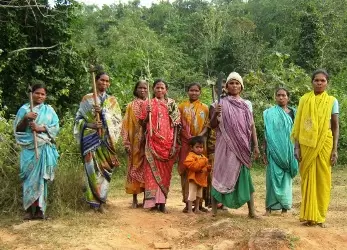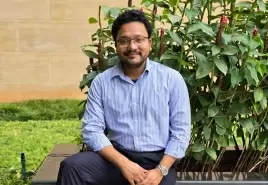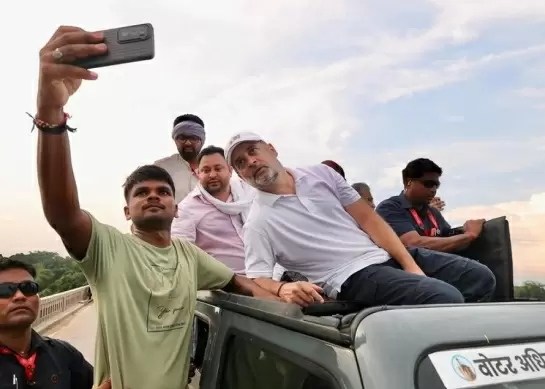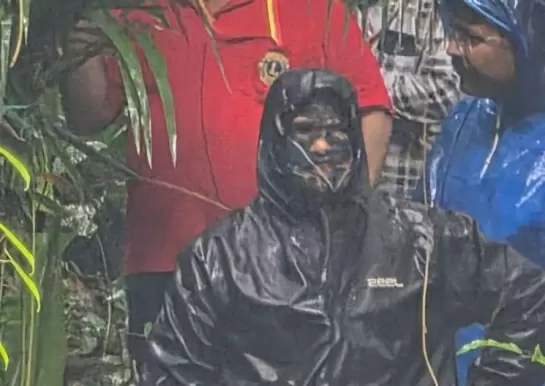Living Farm’s awareness on forest protection has provided food for tribals

19-July-2014
Vol 5 | Issue 29
Travelling around Rayagada district in Odisha one can’t help but appreciate the lush hilly terrain. The countryside in the Muniguda and Bisam Cuttak blocks is like a never-ending stretch of green, all thanks to the hard work and diligence of local tribal women who have taken on the responsibility of protecting the forests, ably supported by Living Farm, a non-government organisation working in the region on issues related to food and nutrition security.
It was a couple of years back that Living Farm started spreading awareness on forest protection in the district as part of the Fight Hunger First Initiative funded by Deutsche Welthungerhilfe (WHH) of Germany.
 |
|
The forest protection group of Patangpadar village in Muniguda block of Rayagada district in Odisha (Photo: Sarada LahangirWFS)
|
The idea behind the exercise was to safeguard the forests and, at the same time, address the issue of malnutrition and hunger among the tribal populations. The dedicated efforts to regenerate a severely depleted green cover are paying rich dividends today.
Says Debjeet Sarangi, Founder and Director, Living Farm, “A few years ago, the timber mafia was very active in the area. They were cutting trees indiscriminately and, in the process, destroying large chunks of the forest. For the tribal villagers, there was a marginal financial gain involved if they gave their tacit support for the transportation of the wood.
“However, with the passage of time, the women started facing the adverse impacts of this illegal activity. They were forced to walk for miles to collect firewood for daily use. Gathering the all-important forest produce also became a tough chore.
“Already struggling to make ends meet, they were concerned about the health of their children as well. That’s when we talked to them about uncultivated foods and told them that if they included these in their diet at least their nutritional needs would be taken care of free of cost.”
Forests are a vital support system for tribal communities across Rayagada, providing them with food, medicine, fodder, fuel wood and water for sustenance. Any move to diminish them threatens the very existence of this otherwise impoverished lot.
Once the women of Patangpadar, a small hamlet in Muniguda block, understood this reality they got down to the task of creating a workable roadmap to renew their green cover. These days they are literally enjoying the fruits of their honest efforts in the form of the Ghodasal Dongar (hill) that is flourishing with mango, jackfruit, guava, tamarind and sal trees that take care of their food requirements round the year.
Every day, Ratani Jakesika, 35, makes her way to the Ghodasala Dongar to pick edible greens, fruits, tuber and roots to feed her children. In the absence of suitable livelihood opportunities, especially during the rainy season, it is this forest that saves her family from going hungry. “The forest is protecting my children from starvation. So is it not my duty to protect it from extinction?” she states.
Like Ratani, Gutuli Saraka, 45, a mother of three, is fiercely protective of Ghodasala Dongar. There was a time she used to migrate for a few months every year in search of paid work. But ever since she joined Ratani and others in the conservation drive she hasn’t felt the need to uproot the family as they are able to meet their nutritional and livelihood needs from the Ghodasala Dongar forest itself.
Since 2012, 20 women from Patangpadar have come together and formed four informal groups of five members each, who fan out in the jungles on a rotation basis, armed with lathis (sticks) and axes.
Even as they safeguard the area from miscreants as well as the timber mafia, they make money by selling non-timber products, such as tendu leaves, char and sal seeds, mahua, harida, kusum, sisal, bamboo, mango and jamun in the market. Moreover, these also become raw materials for making goods like brooms, baskets, mats, ropes and leaf plates, which add to the household income.
It’s been a long journey for the women’s group in Patangpadar and they have bravely faced the challenges that came their way. “Initially when we started this movement the men did not support us because the timber mafia used to give them some money, which they spent on liquor.
“It took time but we were able to transform their attitudes with the help of activists from Living Farm. We have successfully regenerated three ‘dongers’ - Ghodasala, Redagudi and Mundra – each spread over 60 acres,” shares Nandini Sikoka, a proud member of the forest protection group.
Of course, the success of this women’s initiative proved to be a catalyst for change in the region. Their good work inspired the women of Patharagarh, a village of 36 families in the Bisam Cuttak block, to take the movement one step ahead.
When in April 2013, the Forest Department talked about involving the villagers in the mass plantation of teak and eucalyptus, under the Mahatma Gandhi National Rural Employment Guarantee Act (MGNREGA), a livelihood scheme of the government, the women stood up in large numbers to oppose the move. Their argument was clear – besides the commercial trees they needed food and fruit plants in their forest as they enabled them to meet their nutritional needs.
Recalls Tamba Tuika, 67, “We told them that we don’t want these useless trees in our forest. From the leafy greens, fruits and tubers we gather, we feed our families every day. If you want to regenerate the forest please plant trees that we want – those that will give us food, fodder and shelter.” The entire village stood up to the Department, which was unable to convince the community to change their mind. Finally, they agreed to provide saplings of mango, jackfruit, mahua, guava, black berry and barada saga.
According to Bichitra Biswal, Project Coordinator, Living Farm, “Tribal women have always been at the forefront of conservation drives. They are blessed with traditional knowledge of forest management practices and we simply enabled them to gain the confidence to help themselves. These days, 120 women across 60 villages in Bisam Cuttack and Muniguda blocks are part of the forest protection movement.”
Women like Ratani, Gutuli, Nandini and Tamba realise the significance of their work and are prepared to keep it going in spite of the hurdles that may come their way. They assert with confidence, “We have decided to protect our forests at any cost because we know that they are our lifeline.” -Women's Feature Service















